‘Finlandization’: shadow diplomacy around Russian-Ukranian crisis
France offers Finlandization as a solution to Ukrainian crisis
French President Emmanuel Macron traveled to Moscow and Kiev on February 7-8 and met with the presidents of Russia and Ukraine in an attempt to prevent an escalation of the ongoing conflict. As a result, there were no ready-made agreements or a “peace plan”, but some of Macron’s messages caused controversy and anxiety in Ukraine and among Kiev’s supporters. Information appeared in the Western media that the President of France made proposals to Russia that were not agreed with other partners.
Even before the visit, Emmanuel Macron made several statements that Western media and analysts assessed as controversial. In particular, he stated that he “Understands the traumas of this great (Russian) people and this great nation”, as well as the traumas of Russia’s neighbors.
In addition, according to the Le Figaro newspaper, on the plane to Moscow, the French President told several journalists that among the ideas for discussion there is the possibility of the so-called “Finlandization” of Ukraine, which also implies “Ukraine not joining NATO”.
“Finlandization” is a political and historical term that means the subordination of one country to the influence of another. The term has a mostly negative meaning; in Western political science, it was used to describe the relationship between Finland and the Soviet Union after the Second World War.
Finland, in the Winter War in 1939-1940, was able to defend its independence, but under an agreement with the USSR, it pledged to remain neutral, and to take into account the interests of Moscow in its domestic policy.
- Op-ed: which side is Georgia on in the conflict over Ukraine?
- “Increase the price of aggression” – Who is arming Ukraine for a possible war with Russia?
Western leaders and Ukrainian authorities say Russia has deployed more than 100,000 troops to Ukraine’s borders and that a Russian invasion of Ukraine is possible in the near future.
Russia denies any intention to invade Ukraine, but is demanding official “security guarantees” from the US and NATO countries, including guarantees that Ukraine and Georgia will never join NATO.
Washington and Brussels refused to comply with Russia’s demands, nevertheless offering to continue the dialogue.
As a result of negotiations and exchanges of written messages, Russia, on the one hand, and the United States and NATO, on the other, have not yet come to an understanding.
“Next days will be decisive”
The talks between Macron and Putin in Moscow lasted several hours. As expected, there was no breakthrough as a result of the meeting.
The highlight of the meeting were photographs of two presidents sitting at an unusually long table, far from each other. A lot of memes and jokes immediately appeared about it on social media and even several reputable publications.
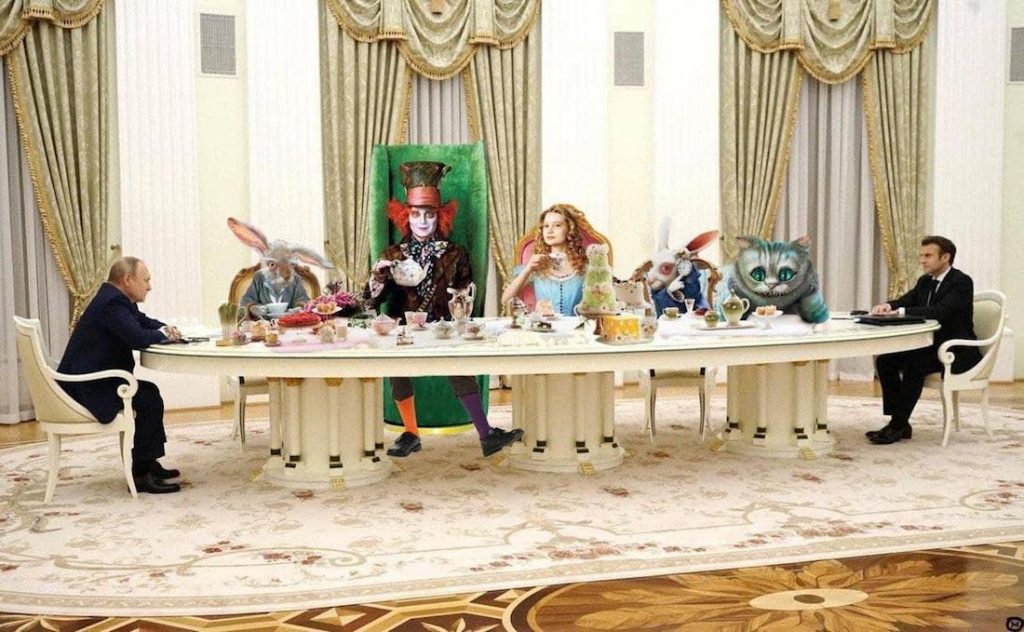
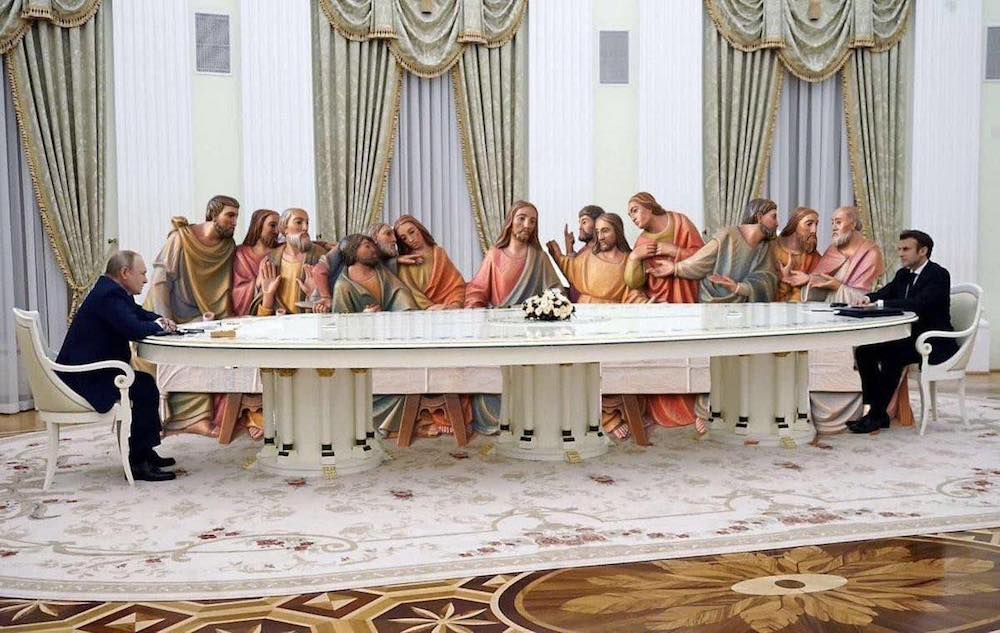
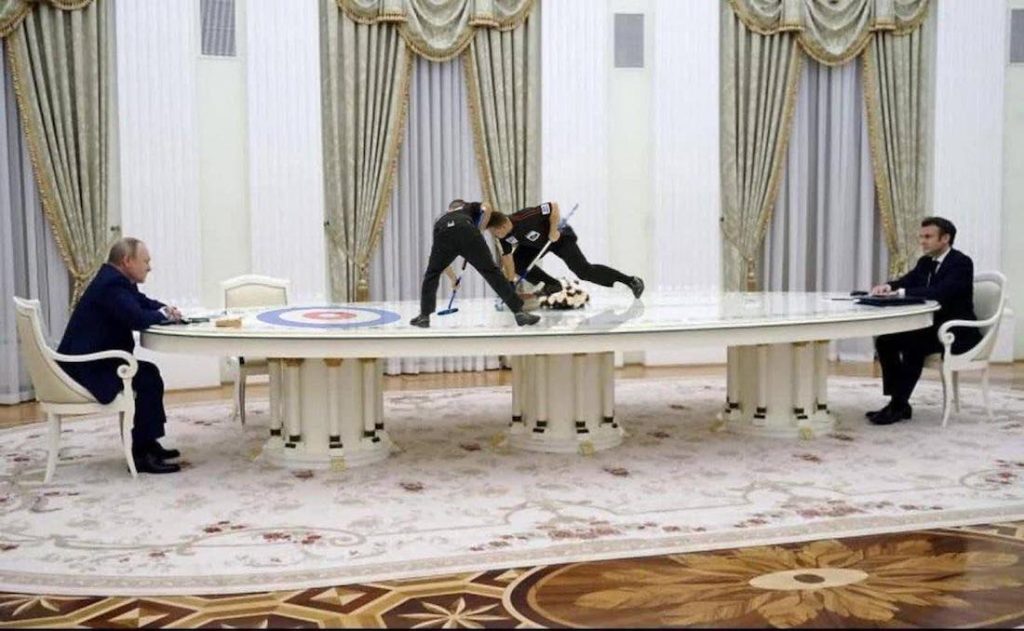
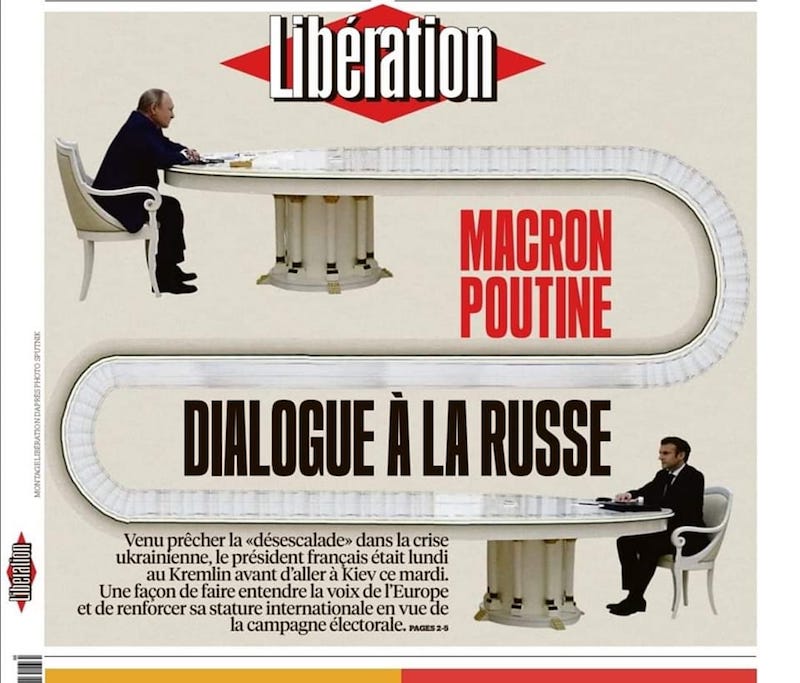
Putin’s main message at the final press conference was that the possible entry into NATO of Ukraine means the threat of a nuclear war – because after joining the alliance, Ukraine could try to return Crimea by “militarily” means.
“Do you want France to fight Russia?!” the Russian President asked French journalists, reminding that Russia is one of the largest nuclear powers.
Both Putin and Macron have repeatedly emphasized the importance of implementing the Minsk ceasefire agreements concluded in 2014 and 2015. The parties still interpret them differently: the West blames Russia for their failure to comply with the agreement clauses, which is why Russia is subject to sanctions.
At a press conference, Vladimir Putin, in an usual form, demanded that Ukraine fulfill the agreements:
“Like it or not, bear with it, my beauty! .. You have to do it! It won’t work any other way”.
In turn, Macron noted that “it is necessary to work very quickly to avoid any escalation”.
According to him, he discussed de-escalation measures with Putin, and “they should be confirmed in the coming days and weeks … The next few days will be decisive”.
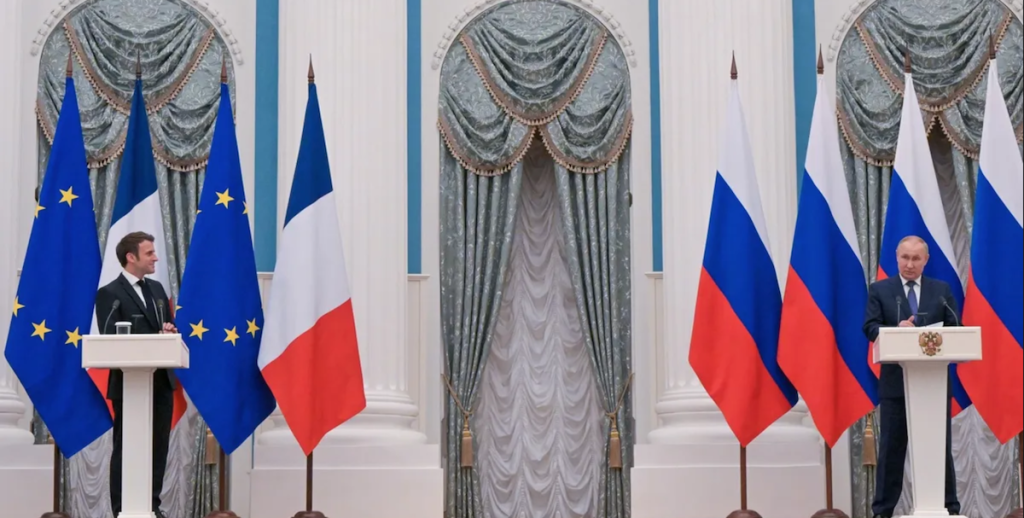
After the meeting, the Elysee Palace, the office of the President of France, issued a statement emphasizing the points on which the parties agreed on the results of the negotiations, including:
- a commitment not to take new military initiatives, which makes it possible to de-escalate;
- the withdrawal of troops at the end of the exercise “West” in Belarus;
- next meetings of advisers in the Normandy format;
- agreement on a structured dialogue on collective security.
However, Kremlin spokesman Dmitry Peskov denied reports that Putin had reached an agreement with Macron to reduce military tensions around Ukraine. “France is both a member of the EU and NATO, where the leadership belongs not to France, but to another country”, Peskov stressed.
“The only path to peace”
Macron’s meeting with Ukrainian President Volodymyr Zelensky was not as long as with Putin – it only lasted about an hour.
At a press conference that followed it, Zelensky said that the talks were about the peace process. He expects that the next meeting of the leaders of the Normandy Four (a format for resolving the conflict with the participation of the leaders of Ukraine, Russia, France and Germany), will take place in the near future. The last time they met was in December 2019.
In turn, Macron said that in order to de-escalate the situation, it was necessary to continue the implementation of the Minsk agreements, which was confirmed by both Putin and Zelensky.
“This is the only path that allows us to move towards a sustainable peace,” said the French President.
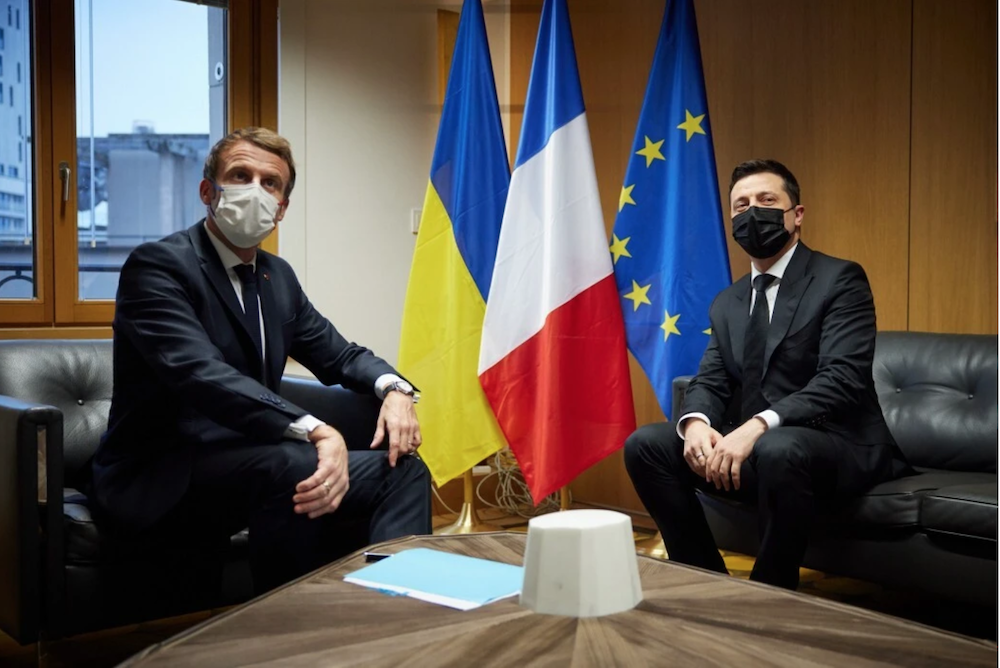
Speaking in Kiev, Macron refuted the “Finlandization” formula which he allegedly proposed using in relation to Ukraine:
“On the contrary, I said that we cannot stop the open door policy! Please use trusted sources of information. Our goal is to restore security in Europe and trust each other”.
However, the next day, the British edition of the Daily Mail reported that during a meeting with Putin, Macron nevertheless made him several proposals that were not agreed upon with NATO and the United States.
In particular, he proposed to secure a neutral status for Ukraine, thereby excluding the possibility for it to join NATO.
“Mr Macron’s proposal for neutrality is not supported by either NATO or the government of Ukraine”, a British government source told the publication.
Minsk agreements – what’s wrong with them?
The document on the settlement of the armed conflict in the east of Ukraine was agreed on February 11-12, 2015 in Minsk by the leaders of Germany, France, Ukraine and Russia in the format of the so-called. “Normandy Four” after tense negotiations. It was signed by representatives of Ukraine, Russia, the OSCE and the unrecognized “people’s republics”.
The agreement, in particular, provides for:
- Ceasefire, withdrawal of heavy weapons from the line of contact and exchange of all prisoners and hostages
- Adoption by Ukraine of the law on the special status of the Donetsk and Luhansk regions
- Amnesty for participants in the conflict
- Conducting local elections in accordance with Ukrainian legislation and under the supervision of the OSCE
- Withdrawal of all foreign troops and mercenaries, disarmament of illegal armed groups
- Transfer of control over the border with Russia to Ukraine
- Participation of local authorities in the appointment of judges, the creation of a local “people’s militia”
- Amendments to the Constitution of Ukraine with a view to its decentralization
Most of these items have not yet been implemented. The parties blame each other. Moscow accuses Kiev of the fact that Ukraine has not finally adopted a law on the special status of the territories of Donbass not controlled by it, and is also in no hurry to change the constitution.
Kiev, on the other hand, accuses Moscow of not withdrawing its troops from Ukrainian territory.
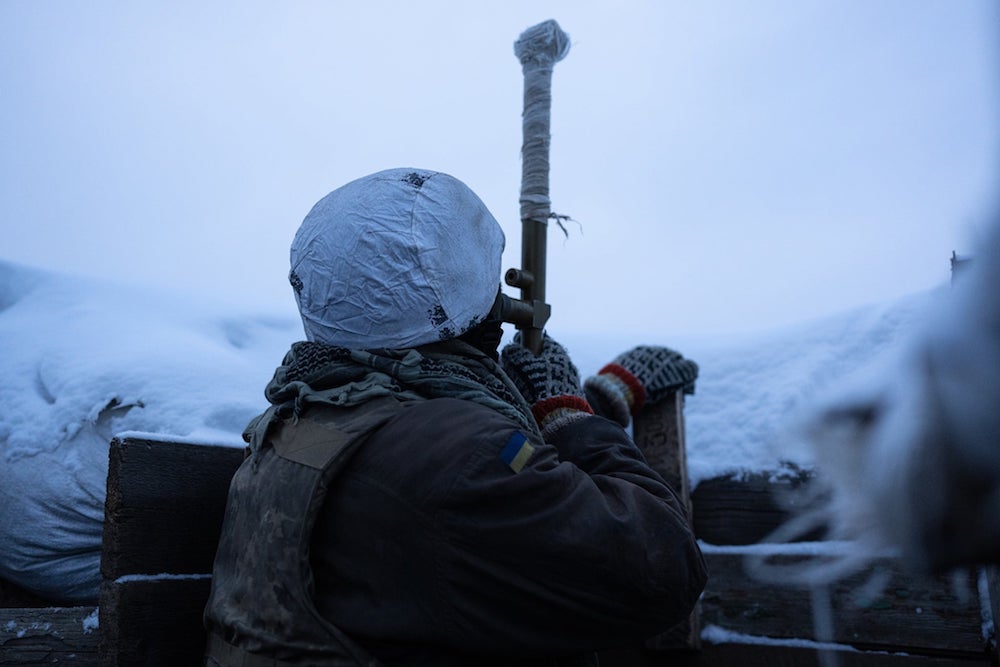
Many in Ukraine fear that Kiev’s unilateral compliance with all the terms of the agreement will turn Ukraine into a divided country with a Russian-controlled enclave within it, giving Moscow leverage to influence Ukraine’s domestic and foreign policy.
“From the very beginning, the Minsk agreements were considered by Kiev, Moscow and the West in different ways. For the Ukrainian presidents – both the previous and the current – these agreements have always been just tactical maneuvers. Under Poroshenko, agreements were signed after military defeats, but they were never implemented according to strategic parameters”, Hromadske Ukrainian publication explains.
They are not being implemented under Zelensky, who, however, is trying to turn both Minsk and Normandy to his advantage, constantly focusing on ceasefire initiatives, the disengagement of troops and the release of prisoners.
“Fortunately, today the new US policy in Europe, the change of power in Germany and, in general, the unexpected unity of the West in diplomatic opposition to Putin are helping Ukraine in this. It seems that the Russian leader, with his demands like “to return NATO to the limits of 1997”, has bitten off more than he can swallow, and it’s a sin for Kiev not to take advantage of this”, Hromadske notes.
The publication cites the results of a survey, according to which 54% of Ukrainians are in favor of revising the Minsk agreements, and 21% are in favor of completely abandoning them. Only 12% unconditionally support the implementation of the agreements by Ukraine.


















